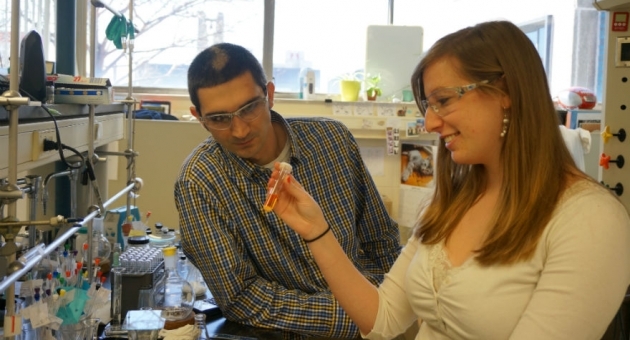
Seven Temple University graduate students have been awarded prestigious National Science Foundation (NSF) Graduate Research Fellowship Program grants. That program recognizes and supports outstanding graduate students in NSF-supported science, technology, engineering and mathematics disciplines who are pursuing research-based master’s and doctoral degrees in the U.S.
Temple chemistry students made a particularly strong showing, with three awardees. The Department of Chemistry was one of only 31 departments nationwide to receive multiple fellowships and one of only 10 to receive multiple fellowships in organic chemistry.
“This is a remarkable accomplishment for both the students and the Chemistry Department,” says Bill Wuest, assistant professor of chemistry, whose lab is working on more potent Lysol-like compounds for use in cleaning oil pipelines, ship’s surfaces and medical devices. “Our students keep getting better and better, and as a result, our research keeps getting stronger and stronger.”
Selected through a national competition, the grantees receive an annual $32,000 stipend and $12,000 cost-of-education allowance for three years. Fellows also might be eligible for access to cyberinfrastructure resources and international research collaborations.
The 2014 Temple NSF Graduate Research fellows are Kathryn Devlin, psychology; Megan Jennings, CST ’12, chemistry; Samuel Markson, chemistry; Kristina Nazimova, anthropology; Steven Schnell, biology; Leah Sheline, psychology; and Christiana Teijaro, chemistry.
Jennings—who, as a Temple undergraduate, participated in Temple’s science-teaching training program called TUteach—was honored for research about communities of bacteria that exist within an extracellular polymeric substance, commonly referred to as biofilms. For non-scientists, that’s pond scum and tooth plaque.
Jennings’ NSF proposal focused on the possibility of using various bacteria to fight each other. “The glue the bacteria produces—the community—makes it a lot harder to beat them. Our group works on combating biofilms through chemical synthesis, and I do a lot of the testing of the compounds.”
Jennings was shocked when she received the award. “I’m so appreciative of the funding,” she said. “It’s not just good for me, but good for the research group, because the funding means we can take on more graduate students and hire more undergraduates.”
Christiana Teijaro, a member of Associate Professor of Chemistry Rodrigo Andrade’s lab, is working on the synthesis of certain natural alkaloids that inhibit the protein responsible for preventing cancer drugs from passing through cancer cells. “As much as I love teaching, I’m very excited to focus on my research 100 percent,” Teijaro said. “The department is conducting innovative, quality research that competes with any university.”